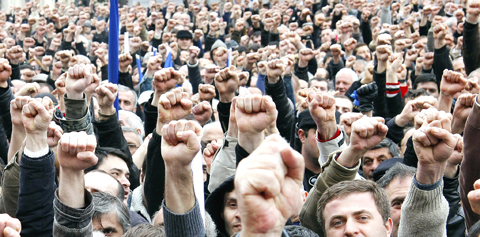Georgian President Mikheil Saakashvili yesterday faced down street protests and rejected opposition demands to resign over his record on democracy and last year’s disastrous war with Russia.
“It’s obvious the answer to this question is ‘No,’” the 41-year-old leader told a news conference when asked if he would give in to the opposition call. “It has always been ‘No,’ because that’s how it is under the Constitution.”
Around 60,000 protesters took to the streets of the capital on Thursday, threatening to mount perhaps the biggest challenge to Saakashvili’s rule since he was swept to power in the former Soviet republic’s 2003 Rose Revolution.

PHOTO: AFP
Dozens of men, drinking wine and warming their hands over a fire, blocked the capital’s main avenue in front of parliament through the night and into yesterday. Opposition leaders called on demonstrators to gather again in the afternoon.
Saakashvili, seen by some Georgians as brash and impulsive, has polarized opinion in the Caucasus country, a transit route for oil to the West.
But foreign diplomats question whether the opposition alliance can maintain unity and muster enough people to join promised daily protests to force him out. They warn tensions risk boiling over into unrest.
“I’ve been facing these ultimatums every other month during the last five years,” Saakashvili said, speaking in English. “Every independent poll clearly proves that people are longing for dialogue, for long-term stability.”
Georgia’s western backers are watching closely for any repeat of the crackdown in November 2007, when police fired tear gas and rubber bullets to disperse peaceful mass demonstrations against Saakashvili. Western officials condemned the action.
The opposition accuses Saakashvili of stifling reforms promised with the Rose Revolution, monopolizing power and exerting pressure on the judiciary and media.
Defeat in a five-day war with Russia, when Moscow crushed a Georgian assault on breakaway South Ossetia and then recognized Georgia’s two rebel regions as independent, has emboldened critics who argue the president has made too many mistakes to remain in power until 2013.
Saakashvili urged the opposition to engage in dialogue, saying he was ready to discuss “all problems.”
Analysts say Saakashvili’s ruling United National Movement retains wide support, and the president’s position appears strong despite the defection of several top allies and repeated cabinet reshuffles.
Many Georgians appear frustrated with the political bickering and are sympathetic to government calls for stability.
“How long can we bear this for?” said Lia Licheli, 41, pointing at the protesters. “If they had brains they would go home. They are just fighting for positions. I can’t bear it.”

Kehinde Sanni spends his days smoothing out dents and repainting scratched bumpers in a modest autobody shop in Lagos. He has never left Nigeria, yet he speaks glowingly of Burkina Faso military leader Ibrahim Traore. “Nigeria needs someone like Ibrahim Traore of Burkina Faso. He is doing well for his country,” Sanni said. His admiration is shaped by a steady stream of viral videos, memes and social media posts — many misleading or outright false — portraying Traore as a fearless reformer who defied Western powers and reclaimed his country’s dignity. The Burkinabe strongman swept into power following a coup in September 2022

‘FRAGMENTING’: British politics have for a long time been dominated by the Labor Party and the Tories, but polls suggest that Reform now poses a significant challenge Hard-right upstarts Reform UK snatched a parliamentary seat from British Prime Minister Keir Starmer’s Labor Party yesterday in local elections that dealt a blow to the UK’s two establishment parties. Reform, led by anti-immigrant firebrand Nigel Farage, won the by-election in Runcorn and Helsby in northwest England by just six votes, as it picked up gains in other localities, including one mayoralty. The group’s strong showing continues momentum it built up at last year’s general election and appears to confirm a trend that the UK is entering an era of multi-party politics. “For the movement, for the party it’s a very, very big

ENTERTAINMENT: Rio officials have a history of organizing massive concerts on Copacabana Beach, with Madonna’s show drawing about 1.6 million fans last year Lady Gaga on Saturday night gave a free concert in front of 2 million fans who poured onto Copacabana Beach in Rio de Janeiro for the biggest show of her career. “Tonight, we’re making history... Thank you for making history with me,” Lady Gaga told a screaming crowd. The Mother Monster, as she is known, started the show at about 10:10pm local time with her 2011 song Bloody Mary. Cries of joy rose from the tightly packed fans who sang and danced shoulder-to-shoulder on the vast stretch of sand. Concert organizers said 2.1 million people attended the show. Lady Gaga

SUPPORT: The Australian prime minister promised to back Kyiv against Russia’s invasion, saying: ‘That’s my government’s position. It was yesterday. It still is’ Left-leaning Australian Prime Minister Anthony Albanese yesterday basked in his landslide election win, promising a “disciplined, orderly” government to confront cost-of-living pain and tariff turmoil. People clapped as the 62-year-old and his fiancee, Jodie Haydon, who visited his old inner Sydney haunt, Cafe Italia, surrounded by a crowd of jostling photographers and journalists. Albanese’s Labor Party is on course to win at least 83 seats in the 150-member parliament, partial results showed. Opposition leader Peter Dutton’s conservative Liberal-National coalition had just 38 seats, and other parties 12. Another 17 seats were still in doubt. “We will be a disciplined, orderly